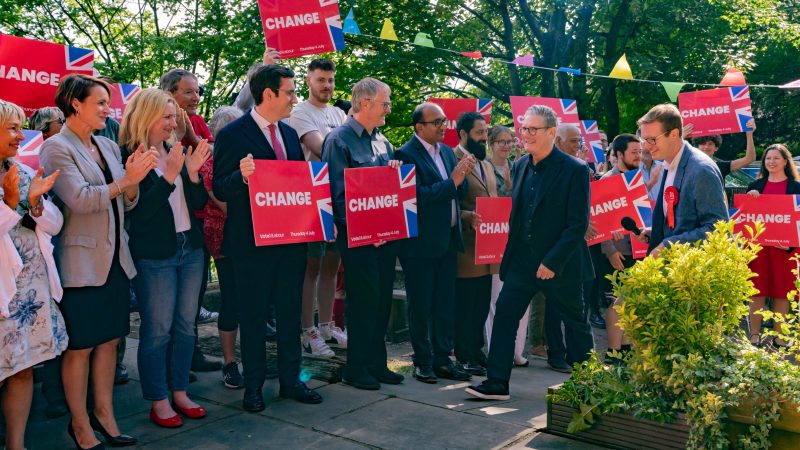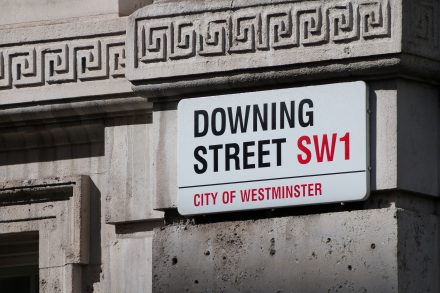
Tonight’s result tells us two things – the electoral volatility of the British electorate over the last decade is in evidence once again, and the electorate has sent the same message it tried to send in 2016 and 2019 that the status quo needs to change.
Labour have made significant, record breaking, gains tonight and Keir Starmer should take significant credit for winning back the confidence of the electorate.
Indeed, a poll by More in Common last week suggested that if this election was a rerun of Johnson vs Corbyn the Conservatives would lead by six points – even after everything that has happened with party-gate, the cost of living and the NHS. What Starmer’s biggest achievement is likely to have been is making Labour feel a safe choice again.
But there is a danger that tonight’s result masks a deeper discontent with the whole of the political system, not just a problem with one political party.
So the polling miss was on Labour’s vote share which looks set to be barely above 2019. Part of this given, the success of Gaza independents, might come down to poor samples of ethnic minority voters which is clearly now even more of a priority to address. pic.twitter.com/lRb5qpMCyp
— Luke Tryl (@LukeTryl) July 5, 2024
Labour looks set to fall below 35 per cent of the vote nationally, with the vagaries of first past the post meaning Labour can still achieve a Tony Blair-style majority on a much lower vote share.
A clear example of that discontent can be seen among the millions who voted for Reform UK returning 4 MPs to Parliament and who now sit in second place party to Labour in my seats across the county.
Read more of our 2024 general election results coverage (article continues below):
Liveblog: Live updates, analysis and reaction to Labour landslide
Labour results tracker: Full list and map of Labour gains, holds, losses, new MPs
‘We did it’: Keir Starmer’s victory speech as Labour crosses key 326 seat line
Liz Truss loses South West Norfolk: Beaten by a lettuce, beaten by Labour
‘What should we look for in Keir Starmer’s cabinet?’
There is no doubt that Nigel Farage’s brand of ‘straight talking’ struck a chord with millions of voters. Time and time again, we would hear from voters what they liked most about Nigel Farage was the fact he ‘says it like it is’ and is himself.
Labour will need to think about how it demonstrates its own brand of authenticity. What is more, with Labour currently projected also to lose seats to Reform, the Party may want to reflect on whether it was a mistake not to take on Reform more directly. It looks increasingly likely that the Reform UK vote will be very similar to UKIP’s in 2015, taking votes from former Labour voters as well as the Tories.
But far more people we spoke to who had no time for Nigel Farage, or Reform UK, and were appalled by his comments on Ukraine and the racism in the Reform UK ranks, also felt the same sense of discontent with the status quo.
In focus group after focus group, they told us they had no faith in politicians nor in any party to sort out the problems the country faces and felt, even if unfair, that most politicians were only in it for themselves.
That discontent is also clear on the left with the shock wins for many independent candidates and defeats for Labour candidates, in many cases off the back of profound feelings of neglect among Britain’s ethnic minority communities.
To give you an idea of how significant Labour’s challenges with Muslim voters has been here is the swing in the seats where over 20% of the population are Muslim. Labour clearly have a real challenge to rebuild trust when in Government. https://t.co/8VFPLjSIsM pic.twitter.com/UJMVviygPY
— Luke Tryl (@LukeTryl) July 5, 2024
‘Politics is fragmenting, left right and centre’
In short, British politics is fragmenting left, right and centre.
But what unites people across the country is a view that the country has become too expensive, public services too unreliable and life simply too hard – and while voters from across the board hope Labour will change that, they don’t yet think they will.
It is possible that the closest parallel to this election is the 2017 French election when Emmanuel Macron won a historic centrist majority, but which masked significant disillusionment and frustration, leading to the situation France finds itself in today with a far right victory very possible in Sunday’s elections.
What does all of this mean? And how can the new Government avoid being swept away by the ever greater electoral volatility that has hit the Tories?
First and foremost, Labour will have their work cut out from day one to show a new type of politics, both in tone and delivery. Keir Starmer talks of the politics of service and respect and we know, from our conversations with voters, making that a reality is likely to be precisely the antidote to the cynicism they feel. But tone alone won’t be enough.
Keir Starmer’s new Government will be judged on whether it gets waiting lists down, whether it makes it easier for people to buy a home, or to be able to rely on public transport or just to save up for a summer holiday. The good news is all of the signs are that the new Prime Minister and his team all get this, the challenge now is doing it.
Read more on how the night unfolded:
Scotland results: Labour makes big gains as SNP obliterated
Wales results: Labour bags 27 of 32 seats as Tories wiped off the map
Jacob Rees-Mogg: Senior Tory loses seat as Labour mayor Dan Norris wins
Gaza: Jon Ashworth loses in Leicester as independents win Blackburn and Batley
Islington North: Jeremy Corbyn holds on in strong result over Labour
Nuneaton, Stevenage, Swindon, Worcester: Labour wins in key bellwether marginals
Read more on what could come next for Labour in power:

Day one: What would happen on Starmer’s first day in charge?
100 days: What would happen during the first 100 days of a Labour government?
Delivering pledges: ‘Change is hard – how can Labour achieve it?’
Manifesto: ‘12 great policies you may never have heard of’
Foreign affairs: ‘Whatever happens to Biden, Starmer faces a US challenge’
Trilemma: IFS warns Starmer will likely have to pick cuts, debt or tax hikes
Read more on how Labour fought this campaign in key battlegrounds:

Aldershot: Can Labour win the ‘Home of the Army’ for the first time in a century?
Bolsover: Labour’s Natalie Fleet on death threats, Dennis Skinner and class today
Brighton Pavilion: Can Labour win the Greens’ one seat?
Bristol Central: Inside Labour’s battle to counter the insurgent Green Party
East Thanet: Inside the battle for coastal ex-UKIP stronghold not won since 2005
Edinburgh endgame: The seat where SNP defeat would signal Labour majority
Dover and Deal: Small boats and Tory mutineers: Can veteran Mike Tapp win?
Finchley and Golders Green: Can Labour win back Britain’s most Jewish seat?
Glasgow South West: Meet the NHS doctor fighting one of Scotland’s tightest marginals
Monmouthshire: ‘Why this CLP is setting the standard in this campaign’
Sheffield Hallam: ‘Can Labour’s Olivia Blake hold on in Nick Clegg’s old seat?’
South West: Could Labour take ‘non-battleground’ Tory seats?
Wimbledon‘s battle of the bar charts: Inside a rare election three-horse race
SHARE: If you have anything to share that we should be looking into or publishing about this story – or any other topic involving Labour or the election – contact us (strictly anonymously if you wish) at [email protected].
SUBSCRIBE: Sign up to LabourList’s morning email here for the best briefing on everything Labour, every weekday morning.
DONATE: If you value our work, please donate to become one of our supporters here and help sustain and expand our coverage.
PARTNER: If you or your organisation might be interested in partnering with us on sponsored events or content, email [email protected].




More from LabourList
‘Labour’s quiet quest for democratic renewal’
‘Labour promised to make work pay. Now it must deliver for young people’
‘Council Tax shouldn’t punish those who have the least or those we owe the most’